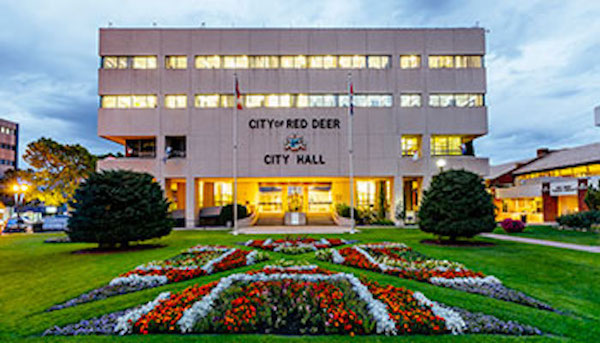City of Red Deer
City goes back to square one in search for permanent shelter site

No site for future permanent shelter currently selected
The most recently considered site for a future permanent shelter in Red Deer is no longer on the table after City Council ceased negotiations with the private landowner last week.
The decision to cease negotiations occurred as the site was determined to be cost prohibitive based on currently committed provincial funds. The size of the site, servicing required, and environmental factors all contributed to the financial constraints, making the site unviable.
On the heels of this decision, City Council is going back to the province to talk about a way forward in absence of a site, and to call on the province to share their potential vision and operating model for a future permanent shelter before moving forward to find another site.
“This is a provincial project. With four sites previously and unsuccessfully put forward to the Province of Alberta, it is time for a different conversation – a conversation that includes discussion about process, about model and operator. We as a City Council want to know what services a future permanent shelter might include. We want to know who it will serve. We want to know how it will be integrated into our community,” said Mayor Ken Johnston. “There are several factors currently hindering our ability to proceed, cost is just one of these factors. We know our community wants certainty, as does City Council. We will continue to do everything we can to work with the province to site and develop a permanent shelter that acknowledges the needs of all in our city.”
Over 130 sites were considered for a permanent shelter in Red Deer, with four formally put forward to the Province of Alberta for consideration:
- The first site considered by City Council was located in Railyards (downtown). Following targeted input sessions, City Council decided not to proceed with the site as it did not align with community needs and values. It was removed as a site option.
- The second site recommended by City Council was located at the north end of Red Deer and was not supported by the province due to concerns related to compatibility with nearby amenities.
- The third site, located in south Red Deer, was unanimously supported by City Council on October 11, 2023, followed by support from the province; however, land negotiations failed.
- The fourth site put forward was located in northeast Red Deer. It was initially supported by the province; however, City Council has now ceased negotiations as it was determined to be unviable. The size of the site, servicing and other factors all contributed to the site being cost prohibitive.
The City is not releasing the addresses of the sites put forward to the province as we focus on next steps and work to respect the privacy of the private property/landowners today and going forward.
“We want to share more information with our community as we progress through this process. But right now, we are working to find a way forward with the province, and we do not have any new information to share just yet. We know this is disheartening for many. I, like you, hoped we might already have shovels in the ground for a new permanent shelter in Red Deer. But siting and developing a shelter in the right place in the right way is important work, and we want to ensure we are aligned in our vision and approach. We are committed to honouring a housing first focus that considers the needs and impacts for everyone in our city. Red Deer, I believe we will get there; we just need to find a new way forward.”
According to Red Deer’s Point in Time (PIT) Count, held in the fall of 2022, the number of persons experiencing homelessness in the city increased to 334 in 2022 from 144 in 2018, confirming local outreach staff expectations that the number of people experiencing homelessness is increasing.
The temporary shelter is approved to continue to operate in its current location at 5239 53 Avenue until at least May 1, 2025, with City Council remaining committed to continued emergency shelter in Red Deer.
A community update will be provided following City Council’s meeting with the Province of Alberta. A date has not been set for the meeting, but Mayor Johnston anticipates a response from the province this week.
For more information on the future shelter project, visit reddeer.ca/shelter.
FAQ: Permanent Shelter
Work related to siting and development of a permanent shelter in Red Deer continues with The City of Red Deer working alongside the Province of Alberta in its endeavour to site and build a permanent shelter in our city.
1. Why does Red Deer need a permanent shelter?
The purpose-built permanent integrated emergency shelter will be designed to respond to the long-term social needs of our vulnerable population. Council has advocated for a housing-focused shelter model where a move to permanent accommodations is prioritized, helping to ensure shelter stays are brief, rare, and non-reoccurring.
Over the past decade, temporary emergency shelter solutions have been implemented but these have not been designed spaces to support service delivery to those who are facing homelessness and addictions. People in the social service sector have worked tirelessly to support those in need, but they need support to advocate and implement long-term strategies that will be mutually beneficial.
According to Red Deer’s Point in Time (PIT) Count, held in the fall of 2022, the number of persons
experiencing homelessness in the city increased to 334 in 2022 from 144 in 2018, confirming local outreach staff expectations that the number of people experiencing homelessness is increasing.
2. What does purpose-built mean?
Purpose-built, in reference to the permanent shelter, refers to the design of the building and the spaces and amenities that are included. The design and build should meet the needs of those who will access the services offered, as well as supporting the surrounding neighbourhood and the community. The City and the province will work with the community to identify the necessary components of the build, ensuring its success as part of a continuum of social support services offered in Red Deer.
3. What does integrated mean in relation to a permanent shelter?
When The City refers to a future permanent shelter as being “integrated”, it means the facility will include a variety of services to help the immediate needs of our vulnerable population, including a primary focus on their journey to obtaining and retaining permanent housing. Services that support an individual’s immediate needs can include items like food, laundry, a safe place to sleep, and medical services. Other services that may be considered in the permanent shelter include services like addiction and mental health support, help in obtaining identification, support in obtaining income, among other services. Some services may be permanent fixtures in the shelter, while others may be temporary or satellite offices.
4. What is The City’s role in the shelter project?
This is a provincial project; however, The City of Red Deer has been a partner in the site selection process with the Province of Alberta looking to us to recommend a site that we believe works for our community.
The Province of Alberta has ultimate authority over decisions related to the permanent shelter, with The City of Red Deer’s authority and formal responsibility limited to zoning and/or permitting for a future site.
5. Has a site been selected for the future permanent shelter in Red Deer?
No. At this time, a site for the future permanent shelter is not selected as the four sites put forward by The City of Red Deer to the Province of Alberta have not moved forward due to a variety of factors including, but not limited to financial constraints. The size of the site, servicing and environmental considerations are all factors that have contributed to the site being cost prohibitive.
6. Why not? And what sites were put forward?
Over 130 sites were considered by The City of Red Deer for a permanent shelter, with four formally put forward to the Province of Alberta for consideration.
• The first site considered by City Council was located in Railyards (downtown). Following targeted
input sessions, City Council decided not to proceed with the site as it did not align with community
needs and values. It was removed as a site option.
• The second site recommended by City Council was located at the north end of Red Deer and was not supported by the province due to concerns related to compatibility with nearby amenities.
• The third site, located in south Red Deer, was unanimously supported by City Council on October 11, 2023, followed by support from the province; however, land negotiations failed.
• The fourth site put forward was located in northeast Red Deer. It was initially supported by the
province; however, City Council has now ceased negotiations as it is cost prohibitive.
7. Why won’t The City release the addresses of the recommended sites?
There are many factors to consider in releasing addresses of the considered sites. Not all of the sites being considered are municipally or provincially owned, and The City of Red Deer and Province of Alberta are committed to not only protecting the integrity of the negotiation process in advance of securing a site, but also want to respect the privacy of private property/landowners who may choose to enter into negotiations with the province about a potential site.
8. When will another site be chosen?
We do not know. City Council is committed to moving forward as quickly as possible, but there are many factors at play. More information will be shared following a meeting with the Province of Alberta that is expected to take place in the coming weeks.
9. How much will the future permanent shelter cost, what funding is currently in place and who is
funding the project?
We do not yet know what the full cost of a permanent shelter might be. It is a provincially funded project with the province committing $7 million towards the purpose-built integrated shelter in Red Deer. This occurred initially in March 2018 with the newly elected government recommitting these funds in November 2020.
10. How did City Council decide what sites to recommend to the Province of Alberta?
City Council set its policy direction through the development of some site criteria to help guide the site selection process. The criteria includes:
• Ability to acquire site
• Adequate size
• Broad community impact
• Impacts to surrounding area
• Accesses to services and supports
11. Has The City consulted the public about the permanent shelter?
Yes. The City consulted citizens and stakeholders along the way, through the following mechanisms:
• In February 2022, The City hosted seven targeted meetings with a third-party engagement
specialist to develop an understanding about downtown property owners, businesses,
associations, and service providers to provide feedback on process and a particular site, that was
proposed.
• In May and June 2022, The City hosted online and in person input opportunities with more than
900 participants.
• City Council continues to evaluate and assess informal comments and contributions from citizens
and stakeholders about the permanent shelter.
12. Will there be future opportunities for engagement and consultation with the community?
When a future site is selected, it may require a public hearing if it is not appropriately/already zoned for shelter use; however, we do not yet know where a shelter may be located and therefore, we do not yet know what the formal consultation process may look like. The City expects the Province of Alberta will consult citizens and stakeholders in the development and construction of a permanent shelter in Red Deer.
13. Why are many of the conversation about shelter being had in closed meetings of Council?
Unfortunately, closed meetings of council have been necessary throughout this process as we worked to protect the integrity of the negotiation process and moved through site selection options. At the end of the day, there were more than 130 addresses considered with some of these sites being municipally and provincially owned while others are privately owned.
City Council directed administration to leave no stone unturned, which meant an exhaustive and iterative process before property/landowners would ever be engaged. It would be unreasonable to expect administration to reach out to all private property/landowners in advance of City Council’s review process.
Closed meetings were necessary to protect the interests and privacy of property/landowners on the list of potentially considered sites, to protect the integrity of the negotiating process, and to ensure administration and City Council could be thorough in its review and analysis before ever coming back out to the public.
City of Red Deer
City of Red Deer Employee Honoured with Bob Stollings Memorial Award for Outstanding Contributions

Annette Scheper, Community & Program Facilitator in the Safe & Healthy Communities Department is The City’s 2025 recipient of the Bob Stollings Memorial Award.
The Bob Stollings Memorial Award is given out each year to a City employee who displays outstanding performance in alignment with The City’s RISE cornerstone values – respect, integrity, service and excellence. Nominations for the award are submitted by fellow coworkers detailing the employee’s achievements professionally and interpersonally, along with letters of support. The award is considered a great honour among City staff.
With an impressive 22-year career, Annette has played a pivotal role in shaping Red Deer’s cultural and special events landscape. Her leadership and innovation have brought thousands of successful events to life, creating lasting traditions that enrich the lives of residents. Her commitment to excellence and resourcefulness has ensured that community initiatives are inclusive, accessible, and impactful.
One of Annette’s most notable achievements is the development of the Community Loan Program, which provides essential resources for local groups, contributing an annual value of $86,778.95 back into the community. In addition, she has successfully led and executed a variety of large-scale events, demonstrating remarkable problem-solving skills and a dedication to sustainability. From creating elaborate event designs with repurposed materials to managing complex logistics, she continuously sets the standard for excellence.
“Annette exemplifies the best of our organization,” said City Manager, Tara Lodewyk. “Her unwavering dedication, innovative thinking, and ability to bring people together has made a profound impact on our city. This award is a testament to her hard work and passion for creating meaningful experiences for our community.”
The Bob Stollings Memorial Award was first established in 1985 and is presented every year to honour Robert (Bob) E. Stollings, a loyal and dedicated City employee from 1960-1984.
City of Red Deer
Red Deer will choose a new Mayor as Ken Johnston decides to step away

It’s a telling detail about the person who leads Red Deer City Council. Always putting the city’s needs ahead of his own, Mayor Ken Johnston has announced his intentions within days of the opening of Nominations for October’s municipal elections,
After 12 years on council, Mayor Ken Johnston has decided against running for a second term as Mayor this fall. Johnson shared his decision in front of colleagues and supporters in a touching announcement on Wednesday.
At 71 years old, Johnston remains vibrant, passionate and healthy. He says that’s exactly why he and his wife Carolyn have decided now is the right time to start their next stage of life together.
Mayor Johnston listed a number of highlights and achievements he can look back on, including his help advocating for the redevelopment of Red Deer Regional Hospital, the growth of Red Deer Polytechnic, and positive moves in Economic Development.
All these lead of a feeling of ease about the decision to step away, though affordable housing and a permanent shelter for the homeless remain pressing concerns.
With about 8 months remaining in his term, Mayor Johnston is planning to push hard to move the needle on these housing issues.
“We’re looking forward to some more work and we’ll be going to the community shortly about it. So I still have optimism that maybe before the term is out we can have an announcement.”
This is the second major political announcement in Central Alberta in the last number of days. Earlier this week Red Deer Mountain View MP Earl Dreeshen announced he won’t be running in the next federal election.
-

 2025 Federal Election15 hours ago
2025 Federal Election15 hours agoOttawa Confirms China interfering with 2025 federal election: Beijing Seeks to Block Joe Tay’s Election
-

 Energy1 day ago
Energy1 day agoIndigenous-led Projects Hold Key To Canada’s Energy Future
-

 Energy1 day ago
Energy1 day agoMany Canadians—and many Albertans—live in energy poverty
-

 Business1 day ago
Business1 day agoCanada Urgently Needs A Watchdog For Government Waste
-

 2025 Federal Election14 hours ago
2025 Federal Election14 hours agoHow Canada’s Mainstream Media Lost the Public Trust
-

 International1 day ago
International1 day agoPope Francis has died aged 88
-

 2025 Federal Election15 hours ago
2025 Federal Election15 hours agoReal Homes vs. Modular Shoeboxes: The Housing Battle Between Poilievre and Carney
-

 2025 Federal Election4 hours ago
2025 Federal Election4 hours agoBREAKING: THE FEDERAL BRIEF THAT SHOULD SINK CARNEY





